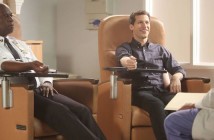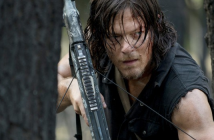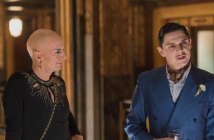July 12, 2015, 9:00 p.m. (EST), HBO
It seems likely that “Down Will Come,” like “Who Goes There,” which was slotted into this place last season, will largely be remembered for its explosive final act. The extended shoot out that ends the episode is good stuff, artfully choreographed by director Jeremy Podeswa, and shot with a smart sense of the varying spaces throughout which the fight takes place. It’s a shot to the arm of an episode that is largely lifeless beforehand, and perhaps the best sustained run of 15 minutes this season has had yet. The shoot out works not because we care about the fates of anyone involved in it (I honestly don’t at all still), but for the same reason that most shoot outs are fun, even when they come packaged in bad films and television: there’s a visceral sense of adrenaline that powers the sequence, which allows it to work almost entirely detached from everything that came before. It doesn’t really matter if you know Velcoro, Bezzerides, and Woodrugh or if you understand why their being shot at. The sequence will work either way. And that means both good and bad things for both this season of True Detective and for the series as a whole.
On the bright side, it means that this is a show that can still craft exciting or iconic moments on a nearly weekly basis. “Night Finds You” had the bird-mask attack, “Maybe Tomorrow” had Velcoro’s dream sequence, and now “Down Will Come” provides a shoot out that might actually be worth writing home about. If True Detective is to continue as a series that is even moderately successful, either culturally or aesthetically, it needs these moments. It has to craft sequences that get people talking and that make it rise above the mediocrity that populates much of the rest of its runtime. If this season can’t be good television, it should at least strive to be memorable television, and while the final act of “Down Will Come” might meet that goal, the rest of the episode is so forgettable I barely remember what happened mere minutes after the credits have rolled.
It isn’t really a great thing for the show that this sequence that marks the end of the first half of the season largely means nothing to what the show is trying to do this year, or rather, that it could be divorced entirely from its larger purpose without losing much of what makes it effective. The famed tracking shot from “Who Goes There” was a canny bit of showmanship, to be sure, but it also followed Rust back into the darkest parts of himself and added real texture to the gritty underworld in which that season took place. It wasn’t just a great action sequence directed with flair; it was also of a piece with the season that had built to that point and what was coming afterwards. I’m sure that sequence would work divorced from context as well, but I am not sure it would have quite the power it did coming where it did in Rust’s arc, and at the end of an episode where we watched him prepare, physically and psychologically, to reenter a role and a world that had left him a bitter, nihilistic shell of a man.
The same can’t be said of the end of “Down Will Come,” in large part I think because nothing is really going on with these characters this season. They don’t have arcs, at least not that I can make out. They have tortured pasts and brooding presents, shadowy secrets and grim, dark portents about the future. But everything about the plotting of this season seems distinctly uninterested in forwarding or even really examining the characters. We are supposed to care, I guess, when Ani gets suspended for sleeping with a subordinate, or when Paul’s motorcycle is stolen and he is bombarded by the press about his involvement with military contractor Black Mountain (because apparently Paul being hounded by the press about one scandal wasn’t quite enough), but I simply don’t. Nothing about the writing or the performances has sufficiently invested me in these characters to care about things that don’t even really seem that major within the plot. The stakes of Ani’s suspension are so low, she is literally allowed to keep investigating the only case of hers we have been given reason to care about. She’s so suspended, she gets to just keep doing her job because the plot needs her to. Also, Jordan Semyon’s fertility is an actual subplot at this point, even though, unfortunately, her desire to have a baby is pretty much all we know about her. When she is not pleasuring Frank or listening to him cry about rat-smashing, she is pretty much screaming “BABY!” at him while wearing various revealing outfits. This is what passes for more substantive roles for women on True Detective. Don’t worry, though, because Ani is totally not being wasted in a useless subplot about a sex scandal. Oh…wait.
Season two of True Detective feels less like a television show I am watching than something that is happening to me over the course of eight weeks, and in no particularly pleasant ways. When it is engaging me at all, it only does so enough to remind me that basically nothing about this is working at all. The best moments of season two are just that: moments where the show latches onto something interesting, or where it even feints in the direction of being compelling. But I didn’t sign on for an eight episode season to get a sizzle reel. If True Detective is going to be a show of moments, those moments had better get a lot more interesting, very quickly. Otherwise, this season will continue its downward trek from bad to dire.
If True Detective is going to be a show of moments, those moments had better get a lot more interesting, very quickly. Otherwise, this season will continue its downward trek from bad to dire.
-
BAD




